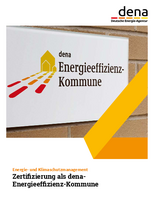
Each year, the roughly 186,000 public buildings in Germany incur around 6 billion euros in energy costs. Germany’s municipalities even spend approximately €3.8 bn simply providing their properties with electricity and heating. So it’s hardly surprising that energy efficiency has become a key issue in the public sector as well. What’s more, the energy transition is a task for society as a whole, in which the Federal Government, state governments and municipalities can and must lead by example in the issue of climate protection.
But often they are lacking the resources and expertise to unlock the energy-saving potential in public buildings, although the introduction of free and inexpensive measures could lead to a 10 to 15-percent reduction in total energy costs. dena advises the Federal Government, states and municipalities on how to achieve the ambitious public sector efficiency targets – for instance in the National Action Plan on Energy Efficiency – and hence contribute to a successful energy transition.
Consultations for municipalities
For instance, an easily applicable energy and climate protection management system as developed by dena would help cut energy consumption and the cost of running public buildings. dena cooperates with regional partners to reach broad cross-sections of German municipalities and to motivate them to save energy. Cities, government districts and local communities that successfully apply the system are publicly recognised as dena Energy-Efficient Municipalities. Additional information on municipal energy and climate protection management is found on the website at www.energieeffiziente-kommune.de..
Long-term refurbishment roadmap
dena develops long-term refurbishment strategies for public sector organisations managing large property portfolios. These refurbishment roadmaps outline how energy-efficient refurbishment of the entire building portfolio can be achieved in the long term. dena The Institute for Federal Real Estate and the Brandenburgischer Landesbetrieb für Liegenschaften und Bauen (Brandenburg Real Estate and Construction Management) have already used this service.
Networked competence
The Centre of Expertise for Contracting for Buildings also offers information and practical assistance for any parties looking to assign the task of improving the efficiency of their building to a service provider, or so-called contractor.




